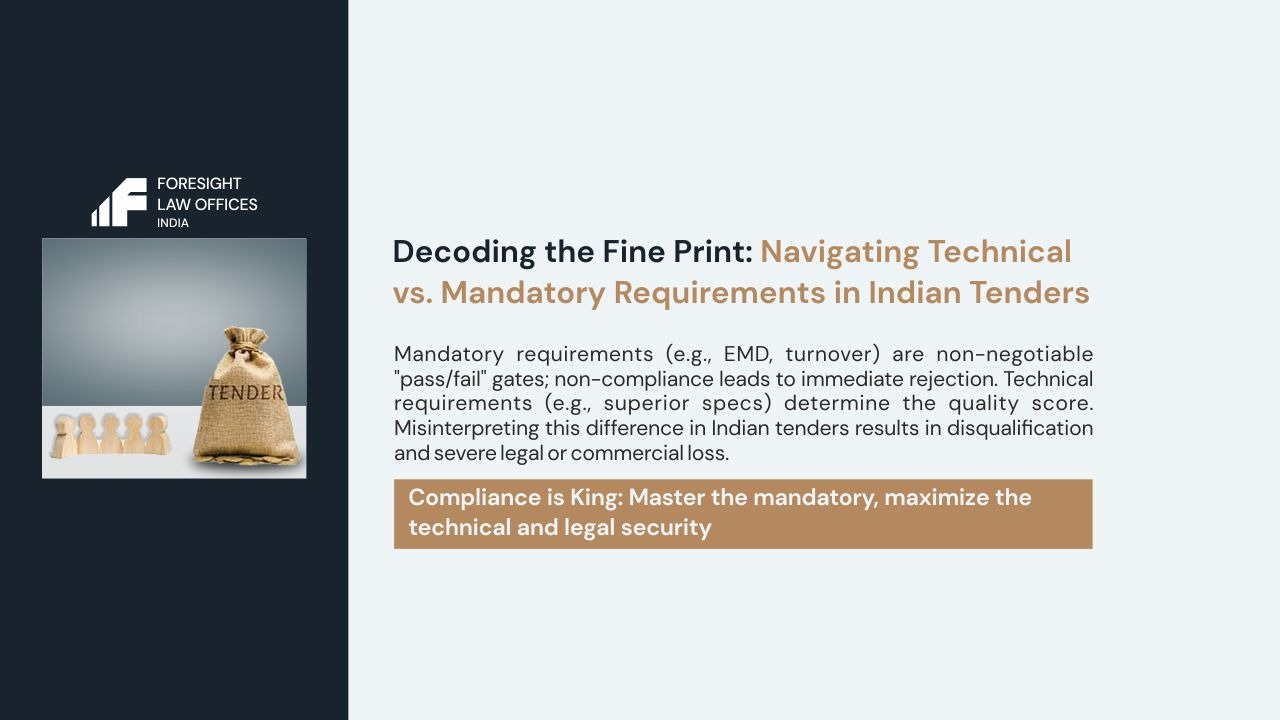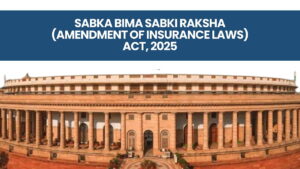Securing a government tender in India is a significant opportunity, but the path to success is often fraught with complex documentation. For bidders, a single mis-step in interpreting the tender document can lead to immediate rejection, costing time, resources, and reputation. The most critical distinction to master is the one between Mandatory Requirements and Technical (Scoring) Requirements. Misinterpretation of this fine print is the single biggest cause of bid disqualification.
The Crux of Tender Law: Mandatory vs. Technical
In the Indian public procurement ecosystem, governed by principles of fairness, transparency, and the General Financial Rules (GFR), every requirement of tender serves a distinct purpose.
1. The Gatekeepers: Mandatory Requirements
Mandatory Requirements, often called Eligibility or Preliminary Requirements, are the absolute bedrock of a bid. They are the non-negotiable “Yes/No” criteria that a bidder must comply with for their bid to be considered responsive.
- Definition: These are essential conditions whose absence or non-compliance renders the bid non-responsive and subject to summary rejection at the initial stage of evaluation.
- Examples in the Indian Context:
- Submission of a valid Earnest Money Deposit (EMD) or Bid Security (unless exempted).
- Valid GST Registration and PAN Card.
- Proof of minimum stipulated Average Annual Financial Turnover (AAT).
- Minimum years of Past Experience in similar work.
- Submission of the bid by the due date and time.
- For specific procurements, having the requisite licenses or OEM (Original Equipment Manufacturer) Authorisation certificates.
Crucial Insight: An expert lawyer in tender laws will stress that compliance with mandatory requirements is a matter of form over substance at the initial stage. Even if your offering is technically superior, missing a single mandatory document like a specific affidavit or an incorrectly formatted bank guarantee will lead to outright rejection. The Procuring Entity (PE) often has very limited discretion to waive these fundamental conditions, as doing so would violate the constitutional mandate of non-arbitrariness (Article 14).
The Score-Builders: Technical Requirements
Technical Requirements, on the other hand, contribute to the Quality Score or Technical Score of the bid, which is critical in a Two-Part Bid system (Technical and Financial). These requirements assess the quality, capacity, and merit of the bidder’s proposed solution or product.
- Definition: These are the performance specifications, quality standards, and desirable attributes that are assigned a score or weight. They do not typically result in outright rejection unless a minimum qualifying score is not achieved.
- Examples in the Indian Context:
- Offering a product with specifications superior to the minimum required (e.g., higher processor speed, longer warranty period).
- Specific methodologies, detailed implementation plans, and proposed deployment of highly experienced Key Personnel.
- Certifications or experience beyond the mandatory minimum.
Legal Consequences of Misinterpretation
Misinterpreting the nature of a requirement of tender has significant, and often fatal, legal consequences in the context of tender law in India.
1. Rejection on Non-Responsive Grounds
The most immediate consequence of failing a mandatory requirement of tender is the rejection of the bid as “Non-Responsive.”
- Legal Standing: Indian courts, including the Supreme Court, have consistently upheld the principle that the author of the tender document (the Procuring Entity) is the best person to understand and interpret its requirements. They are generally granted wide latitude in deciding on the responsiveness of a bid.
- Judicial Restraint: A bidder challenging a rejection for non-compliance with a mandatory requirement of tneder faces an uphill battle. Courts exercise judicial restraint in contractual and commercial matters. Intervention is limited only to cases of malice, arbitrariness, unreasonableness, or bad faith. A simple omission or technical flaw that is clearly mandatory in the tender document is rarely overturned by a court. The penalty is the forfeiture of the entire opportunity.
2. Loss of Competitive Edge
Mistaking a key technical scoring criterion for an optional detail can severely reduce your quality score, leading to the selection of a competitor, even if your financial bid (price) is lower.
- L1-Bidding vs. Quality-cum-Cost-Based Selection (QCBS): In a Quality-cum-Cost-Based Selection (QCBS) tender, the final award is based on a combined score. By misjudging a scoring requirement, your technical score might fall short of the competitor, nullifying the advantage of an aggressively low financial bid.
3. Risk of Blacklisting
Repeated, major non-compliance or the submission of false or misleading documents—especially related to mandatory criteria like experience certificates or turnover proofs—can lead to severe legal action.
- Legal Action: The Procuring Entity has the power to blacklist or debar the bidder for a specified period. This is a severe penalty, often involving a show-cause notice and due process, but if upheld, it effectively shuts the firm out of all government procurement for the duration of the blacklisting period. A blacklisting order can be challenged in the High Court under Article 226, but the legal and reputational damage is substantial.
The Bidder’s Action Plan: A Guide to Compliance
To navigate this legally intricate landscape, a bidder must adopt a rigorous and disciplined approach:
- Read with a Lawyer’s Eye: Treat every word as potentially mandatory.
- Create a Dual Checklist: Develop two distinct checklists:
- Mandatory (Go/No-Go) Checklist: Listing every document required for basic eligibility (EMD, PAN, GST, minimum experience). All items must be checked off with a digital signature before submission.
- Technical Score Checklist: Listing every criterion that contributes to the quality score. Ensure you maximise your points in this section to gain a competitive edge.
- Use the Pre-Bid Meeting: The pre-bid meeting is the bidder’s only opportunity to seek clarification on the ambiguous terms. Use it to ask the PE to explicitly confirm whether a specific requirement of tender is mandatory (pass/fail) or technical (score-based). The minutes of this meeting form a legally binding part of the tender document.
By meticulously distinguishing between the fundamental mandatory requirements that secure a place at the table and the value-adding technical requirements that determine the winning score, bidders can significantly de-risk their proposals and ensure their legal standing in the fiercely competitive world of public pro






